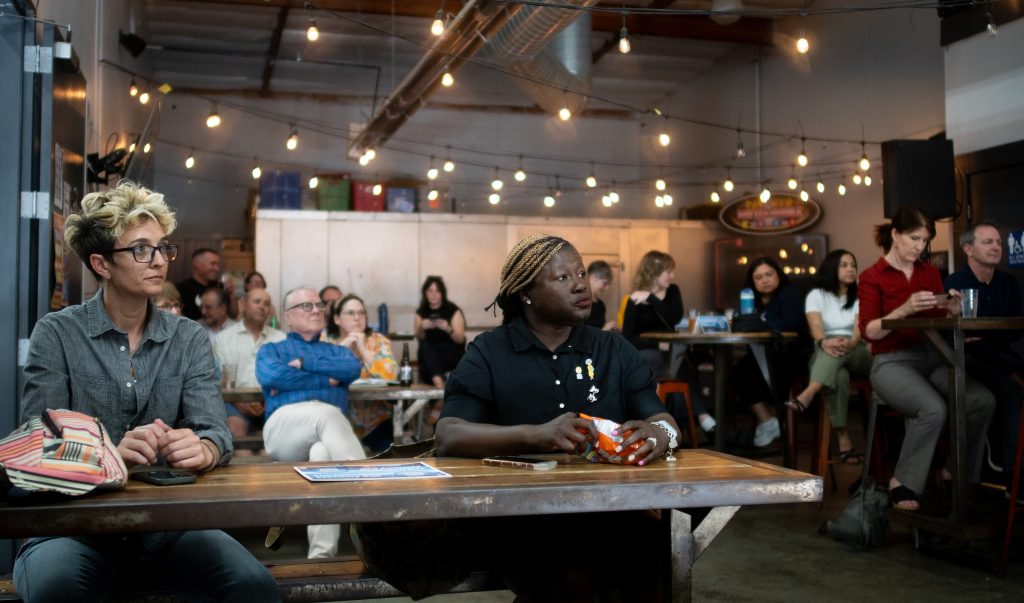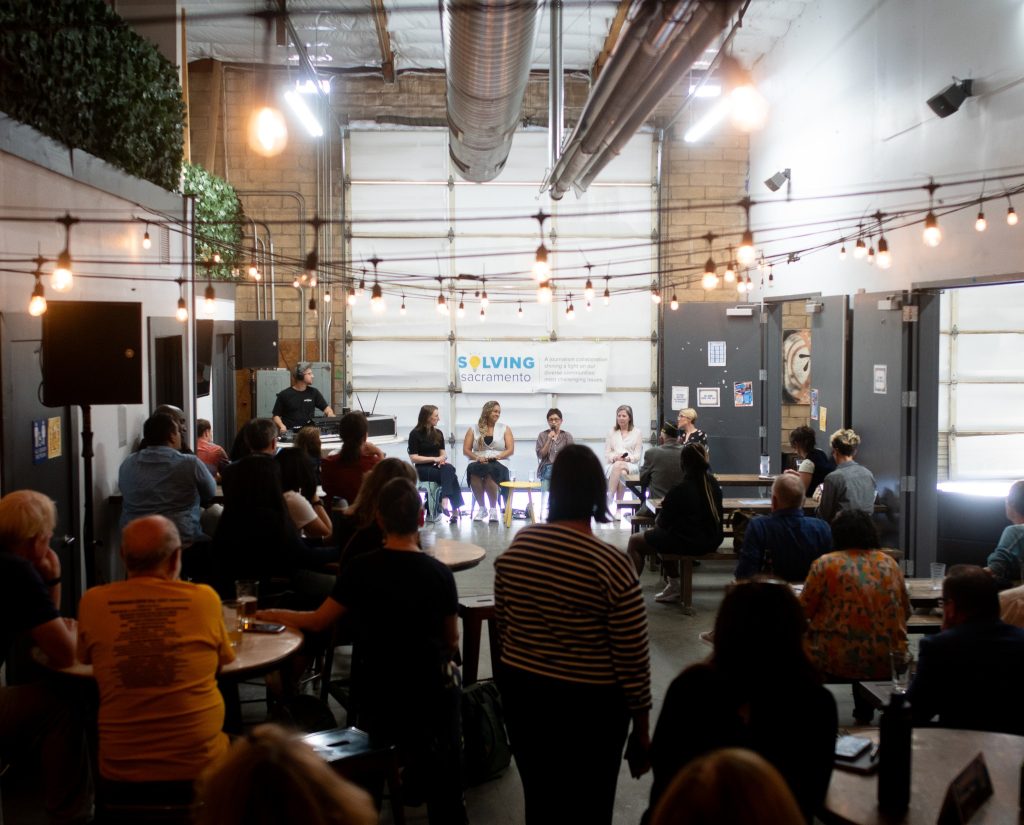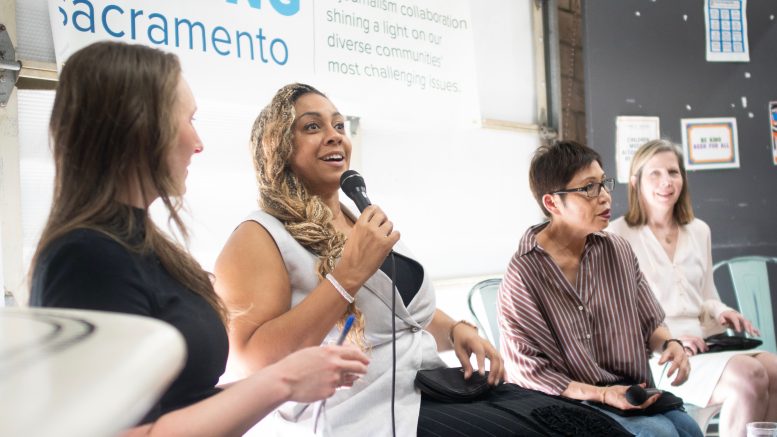By Hannah Ross
Panelists at Solving Sacramento’s “Suds & Solutions” event on Thursday, May 9 agreed that the conditions are ripe for Sacramento to be the inclusive economy of its dreams, but the region can’t let the moment pass it by.
Up for discussion was the recent implementation of California’s $14 million investment for inclusive economic development in the Sacramento region as a part of the statewide California Jobs First Regional Investment Initiative, Valley Vision’s most recent Inclusive Economy Poll, released April 29, and its We Prosper Together initiative. The panel was moderated by Sacramento Business Journal reporter Emily Hamann at Track 7 Brewing in Curtis Park.
The We Prosper Together initiative is a California Jobs First grant-funded collaborative of 150-plus organizations working to create community-led economic development across Sacramento’s eight-county region: focusing on centering community voices, encouraging investment and creating more living-wage jobs.
Valley Vision conducts its polls in partnership with Sacramento State’s Institute for Social Research, which helps the nonprofit organization create data-driven policy and programs specific to the region’s needs. A key factor to the new poll is taking stock of the hurdles the region faces in building inclusive and sustainable economic growth.
“This is really about building a collective vision for inclusive economic development that speaks to the needs of those who have been excluded from these types of efforts in the past, and also advances equity and sustainability in our economy,” said panelist and Valley Vision CEO Evan Schmidt.
Panelists acknowledged that in order to make a more inclusive economy a reality, an intentional plan to include all Sacramentans needs to be made.
“We’re competing against 12 other regions in California for this investment to come here. We have to demonstrate that we have our act together around how we’re going to create pathways for everyone to participate in our regional economy,” said panelist Pat Fong Kushida, president and CEO of Sacramento Asian Pacific Chamber of Commerce.
The California Jobs First third phase of funding begins in the 2024-2025 fiscal year. Regions are eligible to compete for an additional three rounds of funding for projects ready for implementation.
“There are only going to be so many opportunities in which the government is willing to fund this. … If we’re not willing to come together and step up in order to really realize the vision and aspiration of what this is, it will be a fleeting moment,” Fong Kushida said.

From its recent poll, Valley Vision found that 41% of its 1,748 respondents reported a lack of high-quality jobs — those that pay a livable wage, offer benefits and opportunities for upward mobility — as a barrier to their financial well-being. Affordable housing and the cost of living were also reported as main challenges.
But Schmidt said the We Prosper Together program offers a “historic opportunity” to catalyze change and produce a multiplier effect.
“We are championing investments, policies and actions that actively disrupt those systems that have historically excluded people. … This program allows us to do that together,” Schmidt said.
Placer County’s Economic Development Director Gloria Stearns echoed the need for supporting and bringing in businesses with high multipliers — meaning they create more jobs as they grow — as a key solution.
“One of the things that we’ve been doing in Placer County that’s allowed us to be successful has been collaboration,” Stearns said, pointing to Sierra College as an example of a higher-education institution that adapts to the evolving needs of both employers and job seekers. “They’ve been adapting and adjusting on the fly. They create programs as we need to. They are so responsive and helpful with partnerships.”
Placer is the third fastest-growing County in California. Stearns noted that with growth comes growing pains. “Everybody in Placer County has to make at least $37 an hour. Otherwise, they cannot afford an apartment, they cannot afford to live in Placer County, and then I end up with an affordable housing problem,” Stearns said.
Stearns suggested that small businesses need to be paying higher wages to help address this challenge. Additionally, the panelists said, the region needs significantly more high-quality jobs to support its residents. They also expressed an urgency to address this need as soon as possible.
Fong Kushida pointed to the installation of electric vehicle charging stations as a green economy sector that could benefit from a sense of urgency. SMUD estimates that 9,000 electric vehicle charging stations will need to be installed in Sacramento over the next several years, contracts that Fong Kushida sees as excellent opportunities for Sacramento’s small business community to fill.
“We know from the data that we’re short, 335,000 high-quality jobs in the region to meet the needs of our struggling families,” Schmidt said. “A big piece of this initiative is about job creation, and looking at those areas and those sectors where we have room to grow. … It’s an incredibly critical issue right now to try to create those jobs and raise the wage [and] job quality in the region.”
Stearns stressed the importance of intentionally setting inclusivity as a priority while addressing these challenges. The panel agreed.
“Behind that intentionality [there needs to be] action and real change,” said panelist Dawnté Early, president and CEO of United Way California Capital Region and mayor pro tem of the City of West Sacramento. “I think we know about inequity in our community. We’ve seen it over and over again. … So in addition to the intentionality, it is the plan and it is the action behind that intention.”
Early, who has experience piloting United Way’s guaranteed basic income programs, acknowledged SMUD’s pilot line-worker job training program for people of color, highlighting the potential of these hands-on strategies to change the lives of people in our community. As a wave of green and sustainability-oriented jobs hits the region, Early warns that not acting with inclusivity could mean repeating exclusionary economic patterns.
“It is a social justice issue,” she said. “It’s like a gold rush. It’s only going to be open to everyone for so long before you start to see again, the structural institutional racism, the boundaries, the policies. … Right now, it’s like the wild wild west — everyone can have a seat at this table.”

Fong Kushida raised concerns about the parallels she sees in the national pushback on diversity, equity and inclusion policies and what she has experienced locally. Kushida warned of a recent shift in her over 23-year career advocating for minority small businesses at local and state levels. Most recently, she successfully advocated for Assembly Bill 915, requiring all California state agencies to contract 25% or more small businesses, to create an “economic equity first” action plan, and to report annually their work to support small and disadvantaged businesses.
“It’s hard. We can’t talk about it the way we need to talk about it,” Fong Kushida said, “It’s very frustrating because just as you think you’re making progress [in building an inclusive economy], … now it’s almost like everybody’s contracting, everybody’s stepping back, and budgets are tight. California is going through a tremendous budget challenge right now. And what’s getting cut are the very types of programs that people need to be leaning into right now. That’s what scares me.”
Gov. Gavin Newsom’s plan to cut state spending by $30 billion over the next two fiscal years to address California’s estimated $56 billion budget deficit. At stake are many progressive policies and programs in health care, education, the arts, income support, addressing homelessness and climate change.
Attendees asked questions of direct implementation strategies, how we can hold these goals through the shifting winds of political term limits and what community partnership looks like.
Stearns spoke of Placer County’s internal streamlining process to help local businesses “get to yes,” or to open. Early echoed this sentiment, highlighting work the City of West Sacramento has done to bolster infrastructure that reduces impact fees, so small businesses have an easier time launching and growing roots in their communities.
Early noted that union collaboration can and should be a positive force in developing Sacramento’s inclusive economy. “Our union brothers and sisters need to be at the table with us helping to develop these programs or certificates because they’ve been doing [the work] for years.”
As Mayor Darrell Steinberg’s two terms come to an end, an audience member raised concerns about threats to the progress made by Measure U — the one-cent sales tax Steinberg issued to bolster inclusive economic development.
“One of the biggest concerns over the years as a resident, as a leader of the small business community for North Sacramento, was that when the political winds shift every eight years you lose institutional knowledge in the city,” said Daniel Savala, executive director of the Del Paso Boulevard Partnership. “It goes back to the same business as usual. … What’s next and how do we keep the City of Sacramento accountable to [its goals] long term so that it’s not forgotten?”
Fong Kushida called for capitalizing on these investments by building enduring structures, like Valley Vision has done with We Prosper Together, as an antidote.
“If we’re committed to an inclusive economic development strategy for the region, then we shouldn’t necessarily be beholden to what’s happening currently, based on the political winds, we have to build an infrastructure,” Fong Kushida said. “It really is about boots on the ground, helping our local communities be successful.”
Schmidt voiced agreement.
“We’ve seen so many initiatives that from a political lens, come and go. I feel like we have the potential to hold something like this, that is more collaborative … to approach this in a different way, that isn’t about a short-term solution,” Schmidt said. “It’s really about building a sustainable vision for the region all together.”
This story is part of the Solving Sacramento journalism collaborative. Solving Sacramento is supported by funding from the James Irvine Foundation and the James B. McClatchy Foundation. Our partners include California Groundbreakers, Capital Public Radio, Outword, Russian America Media, Sacramento Business Journal, Sacramento News & Review, Sacramento Observer and Univision 19.


Be the first to comment on "Panelists discuss We Prosper Together initiative and the future of Sacramento’s inclusive economy"